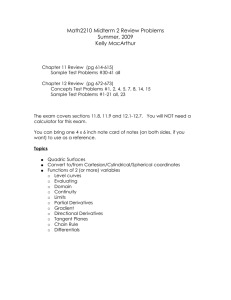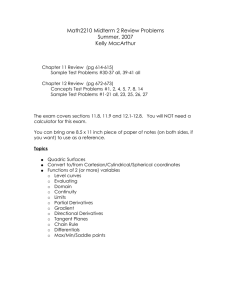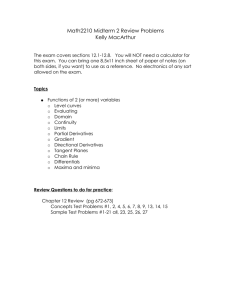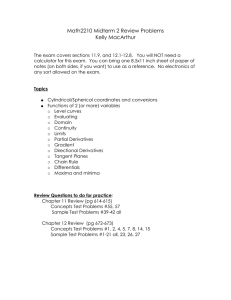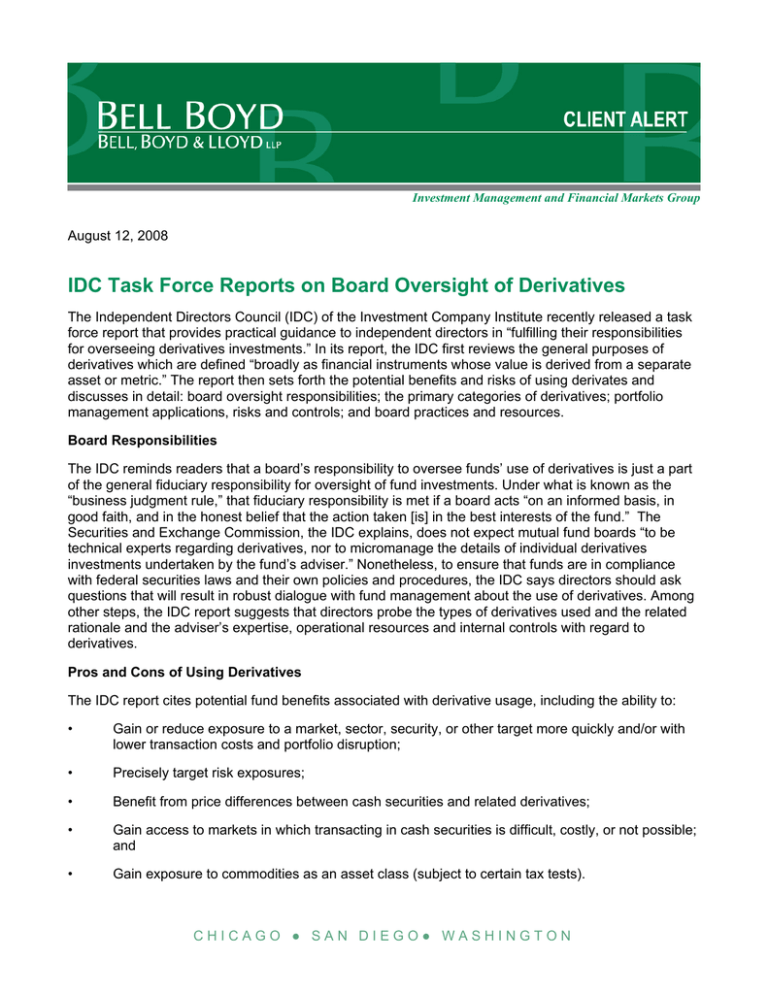
Investment Management and Financial Markets Group
August 12, 2008
IDC Task Force Reports on Board Oversight of Derivatives
The Independent Directors Council (IDC) of the Investment Company Institute recently released a task
force report that provides practical guidance to independent directors in “fulfilling their responsibilities
for overseeing derivatives investments.” In its report, the IDC first reviews the general purposes of
derivatives which are defined “broadly as financial instruments whose value is derived from a separate
asset or metric.” The report then sets forth the potential benefits and risks of using derivates and
discusses in detail: board oversight responsibilities; the primary categories of derivatives; portfolio
management applications, risks and controls; and board practices and resources.
Board Responsibilities
The IDC reminds readers that a board’s responsibility to oversee funds’ use of derivatives is just a part
of the general fiduciary responsibility for oversight of fund investments. Under what is known as the
“business judgment rule,” that fiduciary responsibility is met if a board acts “on an informed basis, in
good faith, and in the honest belief that the action taken [is] in the best interests of the fund.” The
Securities and Exchange Commission, the IDC explains, does not expect mutual fund boards “to be
technical experts regarding derivatives, nor to micromanage the details of individual derivatives
investments undertaken by the fund’s adviser.” Nonetheless, to ensure that funds are in compliance
with federal securities laws and their own policies and procedures, the IDC says directors should ask
questions that will result in robust dialogue with fund management about the use of derivatives. Among
other steps, the IDC report suggests that directors probe the types of derivatives used and the related
rationale and the adviser’s expertise, operational resources and internal controls with regard to
derivatives.
Pros and Cons of Using Derivatives
The IDC report cites potential fund benefits associated with derivative usage, including the ability to:
•
Gain or reduce exposure to a market, sector, security, or other target more quickly and/or with
lower transaction costs and portfolio disruption;
•
Precisely target risk exposures;
•
Benefit from price differences between cash securities and related derivatives;
•
Gain access to markets in which transacting in cash securities is difficult, costly, or not possible;
and
•
Gain exposure to commodities as an asset class (subject to certain tax tests).
CHICAGO ● SAN DIEGO● WASHINGTON
Among the common risks funds face in connection with derivatives strategies, the report highlights
leverage, illiquidity and counterparty risks.
Operations and Regulation
In its report, the IDC also discusses various operational and regulatory considerations regarding board
oversight of derivatives usage, presenting examples of organizational responsibilities and structures.
The IDC notes that custody, collateral, senior securities and asset segregation, as well as valuation,
taxation, accounting and financial reporting are among areas of particular operational and regulatory
concern involving derivatives.
Oversight Resources
In addition to the guidance it imparts, the IDC report contains a number of additional resources for
directors, including an in-depth list of potential topics for discussion with fund management and
transaction examples showing how a portfolio manager might employ derivatives strategies. The IDC
report stresses that there is no precise formula for overseeing derivatives investing and that the level of
derivatives oversight likely will vary from board to board.
The task force’s report is available online at http://www.idc1.org/idc/doclink.do?file=22729.
For further information, please contact Cheryl Allaire 858-509-7424, Cameron Avery 312-807-4302,
Kevin Bettsteller 312-807-4442, Paul Dykstra 312-781-6029, David Glatz 312-807-4295, Alan Goldberg 312-807-4227,
Elizabeth Hudson 312-807-4376, Anna Paglia 312-781-7163, Joanne Phillips 202-955-6824, Paulita Pike 312-781-6027,
Eric Purple 202-955-7081, Bruce Rosenblum 202-955-7087, Donald Weiss 312-807-4303,
Gwendolyn Williamson 202-955-7059, or Stacy Winick 202-955-7040 of Bell, Boyd & Lloyd’s Investment Management and
Financial Markets Group or visit our Web site at www.bellboyd.com.
This publication has been prepared by the Investment Management and Financial Markets Group of Bell, Boyd & Lloyd LLP
for clients and friends of the firm and is for information only. It is not a substitute for legal advice or individual analysis of a
particular legal matter. Readers should not act without seeking professional legal counsel. Transmission and receipt of this
publication does not create an attorney-client relationship.
© 2008 Bell, Boyd & Lloyd LLP All Rights Reserved
www.bellboyd.com
70 West Madison Street
Chicago, Illinois 60602
t. 312-372-1121
f. 312-827-8000
3580 Carmel Mountain Road
San Diego, California 92130
t. 858-509-7400
f. 858-509-7466
1615 L Street, N.W.
Washington, DC 20036
t. 202-466-6300
f. 202-463-0678


